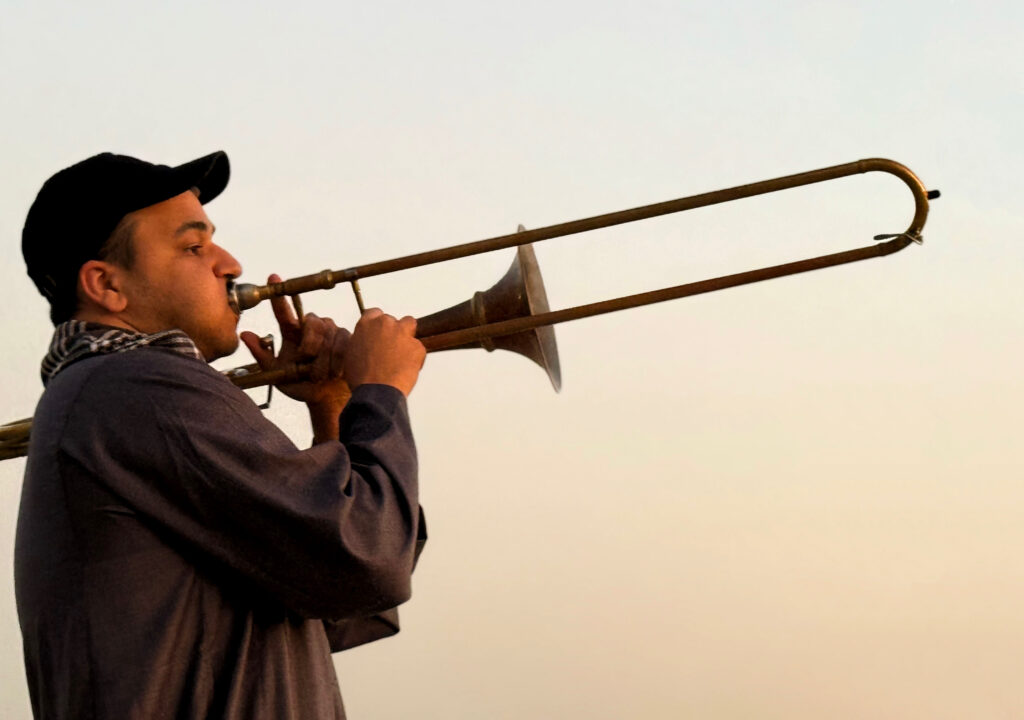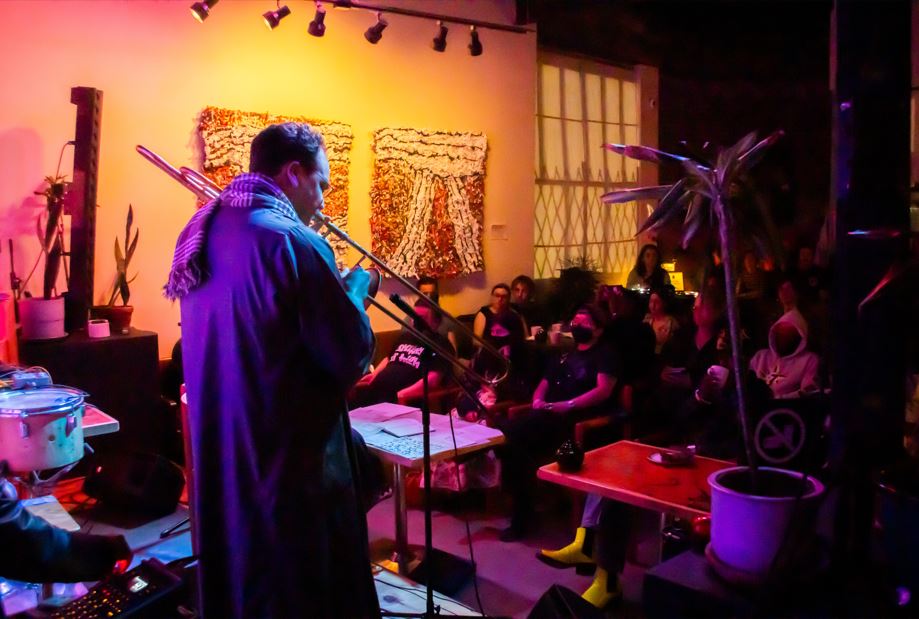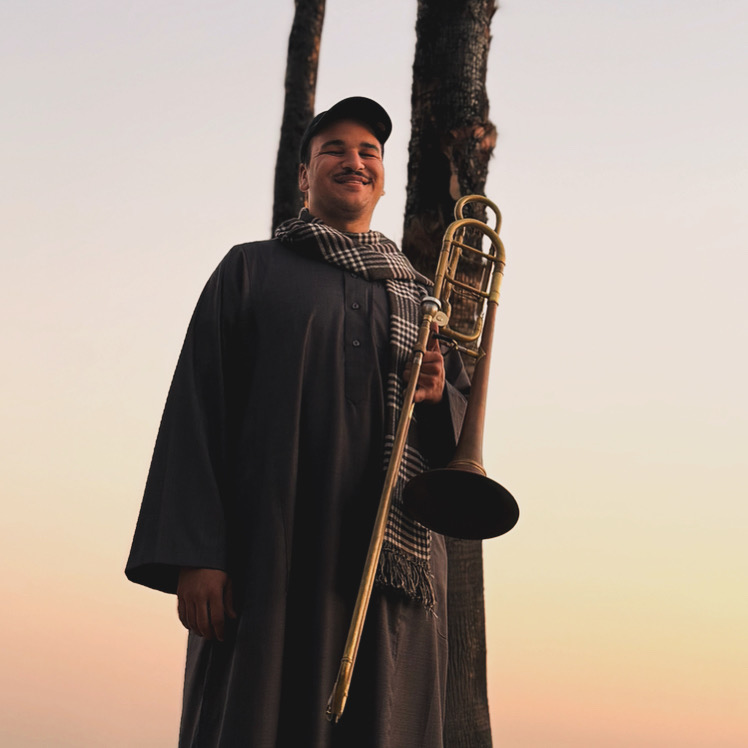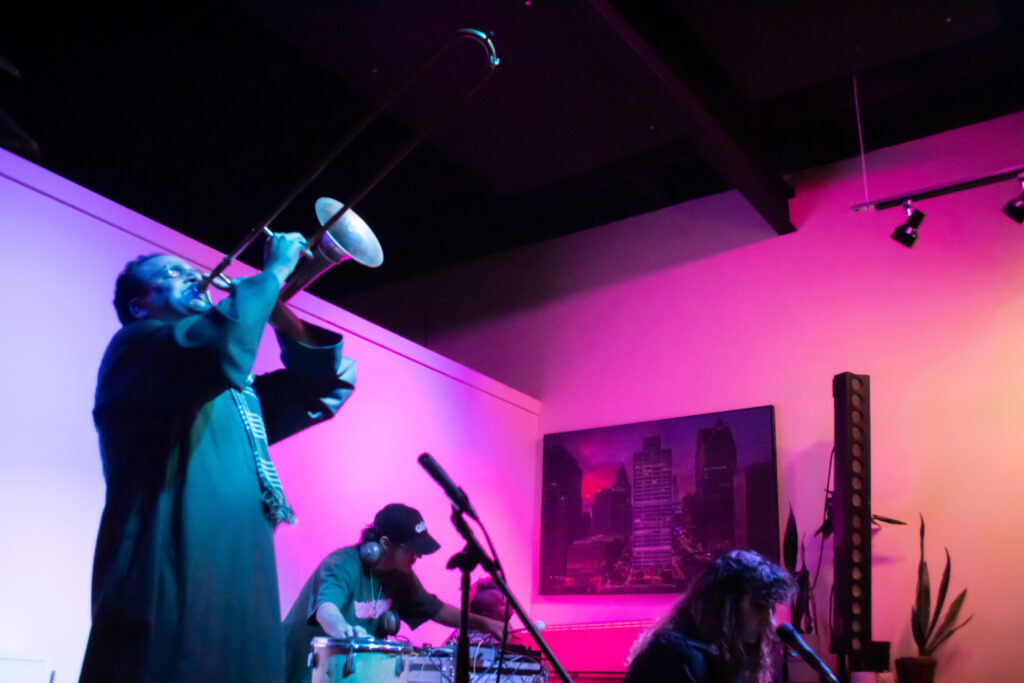"Tuning into My Heritage": 40 Minutes with Zekkereya El-magharbel
By: Layan Srour / Arab America Contributing Writer

Zekkereya El-magharbel is a musician, designer, theorist, composer, and educator, originally from Los Angeles, California, and now based in Ann Arbor, Michigan. Raised in an Egyptian household, Zekkereya’s work seamlessly blends diverse cultural influences, drawing from both their heritage and the broader musical world. Zekkereya’s journey reflects a deep commitment to exploring the intersection of tradition and innovation.
Can you tell us about your upbringing and how it influenced you into music?
I was brought up in a musical household like many others. My mom used to play European Classical music and was particularly interested in Late Romantic/Early Contemporary works. I grew up around Satie, Tchaikovsky, Faure, Ravel, Prokofiev, Katchaturian, etc. My dad listened to many Western bands such as ABBA and Frank Sinatra, but played plenty of Egyptian classics from Umm Kalthoum and others.
I wasn’t interested in Arabic music at the time, I don’t know why, but it could have been that I couldn’t understand the lyrics, or because I wasn’t a fan of the traditional tuning. I remember it used to make me feel really strange, same as when I listened to European Baroque ensembles—all the notes were slightly different from what I was used to hearing, and it felt as though my whole world was tilting when I listened to it.
Maybe it was something like an acquired taste! Listening to classic muqrit such as Sheikh Abdel-Bassit Abdel-Samad, and Sheikh Muhammad Siddiq Al Minshawi gave me a similar tilting feeling—one that I slowly began to look for and anticipate. I couldn’t describe it at the time, but I feel that it conditioned me to look for a certain melodic richness in the music I heard as I got older, it’s likely what magnetized me towards creative music as a whole, the chance to be in spaces where these “tilted sounds” were often brought together.
How would you describe your musical style, and how has it evolved?
I don’t know how to answer this question because style is all relative to what the audience can detect. For example, my sound is partially rooted in the traditions of Great Black Music (as described by Muhal Richard Abrams and the AACM), partially rooted in traditional trombone phrasing in records I used to study growing up, and most recently, in the phrasing of Egyptian vocalists and string musicians (kamanga, rabab, etc.).
I think what deviates from the context of the musical setting becomes seen as style, so, when I play music in the Great Black Music tradition, more of the “Eastern” sounds are apparent (which is what I participate the most in by far), even though, my melodic choices are based solely off of my observation of my Egyptian musical tradition, trying to sound as traditional as I can. In that same vein, there isn’t a strong history of trombonists playing Egyptian music, so there aren’t many direct comparisons of a “sonic continuum” the way that you could compare vocalists to vocalists, or violinists to violinists.
Maybe it could be helpful to talk about influences or inspirations? I am most inspired by three records that I have that have been guiding my trajectory since I found them; all of them are performances of Sufi songs, and they all feature different shuyookh (Sheikh Ahmad Barrayn, Sheikh Ahmed Al-Tuni, Sheikh Yasin Al-Tuhami). I still have a hard time understanding all of the words, but I can feel so much in the phrasing and melodic choices of the shuyookh with their ensembles. When I play my horn, I’m trying my best to get out of my own way and to let those sounds come through as powerfully as I remember them to be.

How do you incorporate elements of Arabic culture or traditional Arabic music into your work, especially since you play a lot of jazz?
It’s all about choosing your moments, but in all honesty, there are many moments to choose from. Arabic music actually works very well with the American traditions of Great Black Music because much like the music that’s come to be referred to as “Jazz”, Arabic music exists on an Afro-Sonic-Continuum. The majority of the Arabic music I study takes place on the continent and can be found abundantly all over.
I find that sometimes “Arabic” music can come to refer to music of the Middle East, and that narrative dominates the conversation on Arabic Music as a whole. But if you look at how far-reaching the Arabic language has reached, you find that Arabic music doesn’t necessarily sound one way; it’s not a monolith. There is even a common thread between the Blues traditions in the States, the music traditions in the Western Sahel, and the Arabic Maqam tradition. Many times when I’m playing in a particular melody, it reads as a “blue note” to the others in the audience, a pitch of particular physio-psycho gravity.
A significant contributing factor to this is the fact that the “blue note” is out of tune with the piano, a pitch that resists assimilating into Western melodies, that remains as a key back to connecting with the ancestors. We have many blue notes in Arabic Maqam; in a sense, they’re all blue notes! In truth, it is far easier for me to go between the worlds of Arabic Music and Great Black Music than it is for me to go between either of those and European Classical Music. There is a spontaneity and vivacity that is required in Arabic music for it to come to life, and the same is true for Great Black Music; there has to be storytelling in each melodic gesture, tarab in each concert. There isn’t much of a difference for me personally.

Is there a specific story, person, song, or project that’s been especially meaningful to you? Something that’s stuck with you throughout your life and still influences your music today?
I have kind of a funny, long, and drawn-out experience that I think about quite often. Basically, it’s the story of how I came up in the Pan-Afrikan Peoples Arkestra. When I was first asked to join, I didn’t think much of it. I went to undergrad at CalArts with Mekala Session, the current leader of the ensemble, and he means a lot to me, so the gig seemed like just another easy performance with someone I care about. But once I was in the ensemble, I began to have a conversation I didn’t know if I was ready to have, one about Egyptian identity and Blackness.
The dialogue came about because the members of the ensemble were often surprised when they found out that I was Egyptian; there wasn’t a strong need for everyone to talk about where they were from, we all knew that we were Africans from all walks of life. Because of Ancient Egypt’s legacy as one of the great African civilizations, there is love and admiration for Egyptians, even if they haven’t met many in person. There is acceptance of Ancient Egyptian culture as a part of a great and sprawling continental history of African greatness, and so naturally, as Africans, many of them see it as a part of their broader cultural context, and see Egyptians as being a part of their extended family.
I wasn’t conditioned to see myself as a part of the African cultural conversation, only as a part of the Mediterranean and Middle Eastern, so I had to navigate this new paradigm. I was in denial for many years, confronting my internalised colorism and featurism that separated me from the full warmth of my peers. They all saw me as a cousin of a cousin; they all had someone in their family who looked like me, and I was hesitant to accept that.
Culturally, I didn’t share the same background either, but they pointed out time and time again that the systems that oppressed them for centuries were not culturally exclusive. And so I began to accept that proposition, to see myself not only as a proud Egyptian, but also as a member of the rich and varied Afro-Diaspora that they are also a part of. That experience in and of itself has been one of my primary motivations for looking at all of the rich and diverse forms of Arabic music throughout the African continent to try and understand contemporary possibilities for Arabic music in the 21st century.

What role do you think music plays in preserving or evolving cultural identity?
Music is a language! Languages must be preserved so that we can communicate through our generations. Languages evolve and adapt based on how they are used, bridging together adjacent communities in harmony. This is true for all of the dialects of the Arabic language and all the dialects of Arabic music. In fact, we have a responsibility to invest in our musical languages lest they be forgotten in the future. I am a testament to this.
I am currently studying Egyptian Arabic so that I can communicate with other Egyptians, but I didn’t grow up speaking it fluently at all. If I didn’t have a personal need to study this language, I may have never become fluent in it, and never passed it down to future generations. I think sometimes we assume that because we will always have music, we will always have our musical traditions.
This is not true, we will have music, but it will likely have increasing influence from the cultures that we live with that do a much more effective job in teaching their younger generations the melodies and rhythms of their heritage. Not only do we have a responsibility to teach the younger generations, but we have a responsibility to imagine new possibilities for where these melodies can go to find out how to adapt, not assimilate to our new environments far away from home.
What advice would you give to Arab Americans aspiring to enter the music world?
Precision is key. I think often times we settle for sounds that are “oriental” enough, “exotic” enough to give us an identity that feels a part from the West. But what gets lost is the subtlety, nuance, and sophistication of our musical traditions. I recommend that no matter what kind of music you’re interested in, you should strive to be connected to your ancestors who preserved music for you over centuries and centuries, and when you listen to this carefully prepared inheritance, listen to it with a sharp and precise ear. It’s important to lock into the subtle shifts of time (rhythm) and space (pitch); therein lies the eloquence. If you listen in detail, you will play in detail; if you listen in nuance, you will play with nuance. Cultivate your hearing to be fine-tuned with your own beautiful cultures!
About the Article and Author: Layan Srour, a Lebanese musician based in Detroit, Michigan, is passionate about blending her culture through music, research, and education in the United States. 40 Minutes With is a weekly feature where Layan interviews an Arab American musician, exploring their journey through music and culture in America. Connect with Layan on Instagram, Facebook, LinkedIn, or via email.
Want more articles like this? Sign up for our e-newsletter! Check out our blog here!








